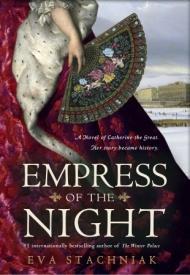 Title: Empress of the Night: A Novel of Catherine the Great
Title: Empress of the Night: A Novel of Catherine the Great
Author: Eva Stachniak
ISBN: 978-0-553-80813-1
No. of Pages: 400
Genre: Historical Fiction
Origins: Bantam Dell
Release Date: 25 March 2014
Bottom Line: Disappointing one-sided focus of a remarkable woman
Synopsis:
“A critically acclaimed historical drama and instant #1 international bestseller, The Winter Palace brilliantly reimagined the rise of Catherine the Great through the watchful eyes of her clever servant Varvara. Now, in Eva Stachniak’s enthralling new novel, Catherine takes center stage as she relives her astonishing ascension to the throne, her rule over an empire, and the sacrifices that made her the most feared and commanding woman of her time.
As the book opens, the charismatic monarch is in her final hours. From the fevered depths of her mind, Catherine recalls the fateful trajectory of her turbulent life: her precarious apprenticeship as Russia’s Grand Duchess, the usurpers who seek to deprive her of a crown, the friends who beg more of her than she was willing to give, and her struggle to know whom to trust and whom to deceive to ensure her survival.
‘We quarrel about power, not about love,’ Catherine would write to the great love of her life, Grigory Potemkin, but her days were balanced on the razor’s edge of choosing her head over her heart. Power, she learns, is about resolve, strategy, and direction; love must sometimes be secondary as she marshals all her strengths to steer her volatile country into a new century and beyond—to grow the Romanov empire, to amass a vast fortune, and to control a scheming court in order to become one of history’s greatest rulers.
Gorgeously written with vivid detail and lyrical prose, Empress of the Night is an intensely intimate novel of a woman in charge of her fortunes, who must navigate the sorrows, triumphs, and hopes of both her soul and a nation.”
Thoughts: Empress of the Night is not the best choice for readers looking to learn more about Catherine the Great for the first time. While the focus of the story is on Catherine, her numerous lovers, and the influences they each had on her policies and military machinations, the actual policies and military actions themselves receive nothing more than cursory attention, if mentioned at all. For someone who lived as long as she did, ruled as long as she did, and made such sweeping changes both inside and outside her country’s borders, there is frankly too much missing information. Not only that, but it is up to the individual reader to place what little information there is into historical context and determine why such information is important.
It is truly unfortunate that Ms. Stachniak chose to concentrate on Catherine’s bedroom life rather her public one. Not only does it tend to support the image of Catherine as sexually insatiable, it demeans her life as one of the most successful Russian czars. She is so much more than her bedroom antics, no matter how influential her lovers were, and yet, in Empress of the Night, her bedroom dalliances and pillow talk remain the focus. One understands that the context of the book is important. After all, it is only natural that one would reflect on the key relationships at the end of one’s life. However, to all but completely disregard her actions in favor of those relationships as Ms. Stachniak does provides too narrow an image of this most impressive leader.
Where Empress of the Night does excel is in providing a very human portrait of this daunting lady. As she wrestles with the last hours of her life and remembers her past, one does see the perilous fragility that bespoke her initial rise to power as well as the perils she faced as a female leader trying to expand her empire in a male-dominated society. Ms. Stachniak also clearly captures Catherine’s fears and concerns as well as the general stressors associated with leading a country. Unfortunately, while the intimate bedroom scenes also portray Catherine’s personality and private side, they are a bit too voyeuristic for comfort, especially as they are by their very nature completely fictional and therefore are pure supposition or wishful thinking.
There are much more thorough and better-written books about Catherine the Great to seek if one truly wants to learn more about Catherine and her tumultuous life. While these books also include her famous relationships, the relationships are not the focal point of each story, as they are in Ms. Stachniak’s latest. While one does not mind the chance to imagine Catherine as a person as well as the formidable leader of one of the largest countries in the world, Empress of the Night trivializes all of her achievements by concentrating too much on her exploits. Sadly, it is a disappointing portrait of one of the best examples of female capabilities and leadership and capabilities because it implies that there is a direct correlation between her power and influence and her sexual encounters. With this suggestion, Catherine becomes nothing but yet another silly female who uses sex to gain power and prestige, to earn favors, and to instill loyalty – everything modern-day feminists would eschew.
